Archive: 2022
Community Listening Sessions
Comments Off on Community Listening SessionsGiven the recent discussions across asynchronous platforms this past week, many related to feedback from SIGCSE TS reviews, we have set up two listening sessions for community members to talk about their experiences and perspectives.
The listening sessions are an opportunity to share concerns about barriers within the community that prevent researchers from reaching their full potential (and even worse, be driven out of the community) AND ultimately helping the hundreds of thousands of teachers and millions of students that we aim to support.
October 12, 4-5pm CT
October 13, 1-2pm CT
The sessions will not be a time for anyone to offer excuses or rationale for these barriers. Also, you do not need to attend both sessions.
Sessions will be moderated and norms will be set to minimize disrespect and harm. You will be able to share concerns anonymously if you choose. Sessions will be closed captioned. For those with disabilities or conflicts and attending is not possible, please feel free to email me directly with concerns.
We offer this as a community place to recognize the harm as well as the trauma that has been experienced by members in an effort to help move the dialogue into forming actionable steps for improvement at a later time. As an aside, the SIGCSE TS committee has offered to share our aggregated results of these listening sessions on their website through a blog post or another mechanism in conjunction with other plans they have for addressing these issues. Though these listening sessions are independent of the SIGCSE board and SIGCSE TS Committee, we hope they can be used to help inform their future plans. However, we are also very open to hearing more broadly about barriers that go beyond SIGCSE conferences and community.
Connecting K-5 Students to Integrated Computer Science
Comments Off on Connecting K-5 Students to Integrated Computer ScienceWe recently partnered with Code.org to conduct a national study that focuses on how K-5 teachers integrated computer science (CS) into their curriculum. Why? Well, Code.org is working on a new and unique CS curriculum called Computer Science Connections.

The goal of their curriculum is to teach computing by making critical connections between learning CS and other subjects like math, language arts, science, and social studies.
Presently, there is minimal research and knowledge available that discusses how and/or why teachers integrate CS into other subject areas. There is also minimal scholarship focused on the barriers teachers and administrators may face when attempting to integrate CS into other K-5 content areas. We believe this will be an important area to watch in the next few years as CS enters into more K-5 classrooms and teachers struggle to balance teaching a new subject without more hours in the day to do so.
Where do we come in? We will be reaching out to states all over the country – 29 in total – to get an overarching view of how and why CS is integrated (or not integrated) into K-5 classrooms. We will also be conducting a systematic literature review (SLR) to better facilitate conversations around promising practices integrating CS into K-5 learning environments. Overall, this information will be used as a launching point that Code.org will be able to use as they continue to expand their mission of teaching all students computer science.
Are you interested in finding out more about our work? Watch our social media and look for our ongoing updates, or visit Code.org’s Computer Science Connections page and start integrating CS into your curriculum.
Computer Science Teachers’ Problems of Practice: Solve This!
Comments Off on Computer Science Teachers’ Problems of Practice: Solve This!In 2021 we received funding from a ACM SIGCSE Special Projects Grant, with our colleague Dr. Michelle Friend (University of Nebraska – Omaha) for a project we called: Solve this! Problems of practice teachers face in K-12 CS Education. Since then we have been working on gathering, analyzing, and disseminating the findings. Overall, our goal for this project is to provide a platform for researchers to understand authentic problems of practice that teachers face in order to bridge the gap between research and practice.
What have we accomplished so far?
At the beginning of the project we designed a survey to be sent to teachers around the world. The survey included demographic questions about the teacher and their locale, but most importantly about the problems of practice they experience when planning, teaching, or attempting to plan/teach computer science in their school or classroom. Once the survey underwent internal and external face validity, we disseminated the survey. Our survey reached teachers in Ireland, Canada, and the United States. We opened it in July 2021 and closed it in October 2021, receiving over 700 responses.
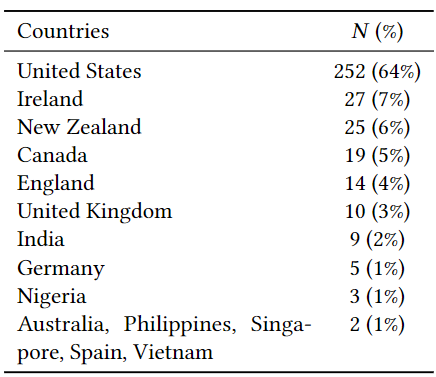
After cleaning the data, we were left with 396 responses. We created over 40 codes as we analyzed the data and several themes emerged. Although we are still in the process of data analysis, some of the initial findings include problems of practice such as a lack of teaching time or schedule availability to teacher CS, poor academic habits, and challenges related to student interactions or partner work. We have been able to share initial results at several conferences and our paper examining our initial set of data has been accepted to Koli Calling 2022.
What is next?
Our goal is to have our interactive K-12 CS education teaching problems of practice populated and ready for use by the end of this year. All of the problems of practice entered through this study will be added to our website and will be searchable by demographics of the teachers who submitted them (e.g., country, years teaching CS).
For researchers, this site will provide you with the problems teachers are facing and can help inform your research agenda.
Teachers will be able to upvote problems of practice that they experience and will be able to add their own problems.
Watch our social media platforms for our Problems of Practice page announcement!
CS Teachers’ Reflection on the CSTA K-12 Teacher Standards
Comments Off on CS Teachers’ Reflection on the CSTA K-12 Teacher StandardsThis past summer, IACE had the opportunity to partner with the Computer Science Teachers Association (CSTA) and CREATE, a research center at the University of California, San Diego, to develop an assessment of teachers’ understanding and use of the CSTA K-12 CS Teacher Standards. As part of this process, we wanted to understand how the Standards can help inform CS teachers’ professional reflection process and their professional development trajectory. With funding from E_CSPD_Week, a U.S. Department of Education EIR grant, CSEdResearch.org joined the partnership to break down the CSTA K-12 Teacher Standards to usable rubric language for personalized reflection and feedback. This summer we piloted a reflection-based assessment for Standards 2-5, with Standard 1 being piloted next summer. After piloting our designed process in two states, Indiana and South Carolina, we learned a lot and continue to improve the process.
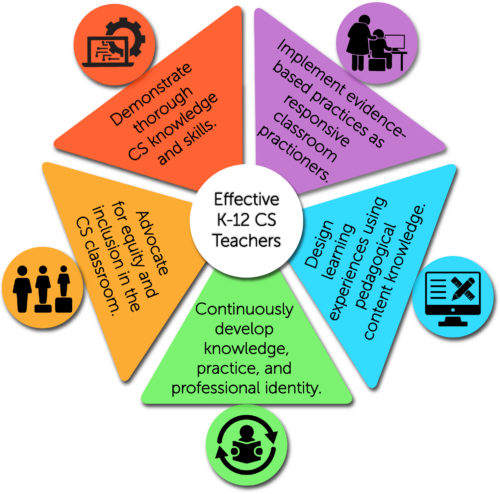
To provide a high level overview of the work that went into the process, our team, along with assistance from CSTA, dissected the CSTA K-12 Teacher Standards 2-5 to create 18 rubric items and scales across three main categories: 1) plan, 2) assessment, and 3) professional growth and development. We then created an entry form to collect the data from a group of teachers in Indiana and South Carolina who participated in the pilot of this work. We are currently undergoing the next phase, scoring and developing a process for external expert readers to provide feedback to the teachers who submit their information as part of this optional process. Our work has resulted in a set of recommendations on how to improve the process so teachers are able to more easily collect and enter their data, which we provided to CSTA and CREATE during a recent discussion. Once completed, this will be tested with a wider group of teachers in summer 2023 and go through a second revision process.
We are also in the process of starting work developing an assessment for Standard 1, CS content knowledge. Working with Dr. Adrienne Decker, we will be creating a brief assessment for AP CS A targeted to high school teachers. We will be piloting this assessment in summer 2023.
Educate Maine: Decreasing Financial Barriers and Increasing Access to Coding
Comments Off on Educate Maine: Decreasing Financial Barriers and Increasing Access to CodingAt IACE we find great value in raising up the voices of our partners who are doing great things in the computer science community. One of those partners is Educate Maine.
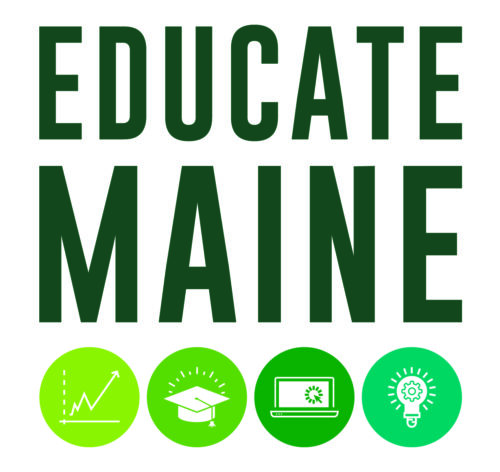
This summer Educate Maine’s signature project, Project>Login, hosted 5 Girls Who Code camps all over the state of Maine.
They were able to provide these camps for free, decreasing financial barriers and increasing access for all students. The girls who participated were able to engage with industry professionals, learn from experienced teachers, and make memories to last a lifetime.
What was our role in this amazing experience? External evaluators. As part of this work, Educate Maine is continuing to reflect and improve their practices through evaluations. The evaluations focused on student and teacher experiences during the week long camps all over the state. Most of the girls who participated in Project>Login’s Girls Who Code camps do not have coding at their school or a Girls Who Code after school program, therefore this summer experience is truly increasing their knowledge of what it means to be a “coder” and, more widely, a “computer scientist”
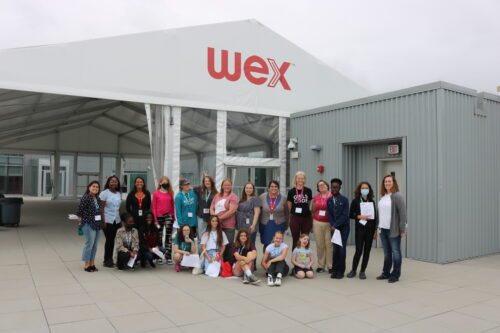
WEX Industry Partner with Girls Who Code campers
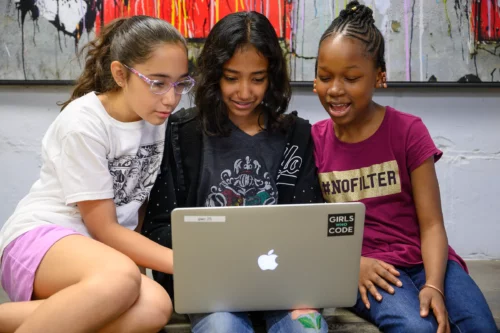
Girls at their Girls Who Code camp

Partner work at one of the Girls Who Code camps
Interested in checking out our other projects? Click here
K-12 Computer Science Teachers Problems of Practice
Comments Off on K-12 Computer Science Teachers Problems of PracticeRecently, K-12 teachers in Indiana spoke to us during #CSTAPDWeekIN (CSTA PD Week in Indiana) about problems of practice that they have experienced or witnessed during their time teaching CS. We highlight here a few of their thoughts.
—-
K-12 CS teachers from Indiana recently shared problems of practice with us that they have witnessed or experienced related to computer science education. Three of these addressed the lack of trained teachers and how that impacts schools and students, misconceptions about who belongs in CS, and the lack of funding for CS education despite state-wide mandates.
Lack of trained teachers
Danielle Carr, CS teacher at Lake Central High School and CS instructor for IndianaComputes!, said, “I wish they (researchers) knew that many of the teachers teaching CS don’t have a background in CS.” Echoing this, Jennifer Hanneken, school library media specialist at Lawrenceburg Community School Corporation, noted that, “Schools need to be required to have computer science taught by a qualified, certified teacher. They need to understand the enormity of the standards.” This is especially true if we are to achieve equitable learning outcomes so that all students receive quality computer science instruction. Of the 35 teachers we spoke with, nearly one-third indicated that they were second career teachers who came from industry and were asked to teach CS specific courses. Nearly half of the teachers were asked or voluntold to teach CS in their schools with limited to no background in CS specific content. This phenomenon is not unique to Indiana and is a known issue in other places around the country and the world. It speaks to how important it is to consider this in our research, particularly how it relates to student outcomes.
Misconceptions about who belongs
Teachers were also aware of the critical aspect of student and teacher perceptions about “who” belongs in CS. Carr further said, “There is a stigma of who ‘should/can’ do computer science”, which inevitably impacts recruitment to courses. Carrie Koontz, 6th grade science teacher at Edgewood Junior High School, echoed this, “Students consider CS as a subject for certain people, not for everyone.” While national statistics (such as those provided by Code.org) display an increase of students studying CS who are from historically excluded populations, there is still a long way to go. Equitable CS education is and continues to be a critical goal that must be achieved both in Indiana and nationwide if we want to broaden participation. Overcoming the notion of who “belongs” is an important first step.
Funding for all aspects of CS education
One of the teachers, Kathryn Dunphy, a K-5 teacher at Avon Community School Corporation, said that “there is an assumption of what Computer Science is, so funding is not provided for what is needed, outside of maybe computers.” Several other teachers said that lack of funding for CS education programs, manipulatives for younger students, and related resources are often pushed to the bottom of budgets each school year. As the policies move forward in state after state and district after district, policymakers and legislatures must ensure that mandates are funded adequately to ensure the best learning outcomes for their students.
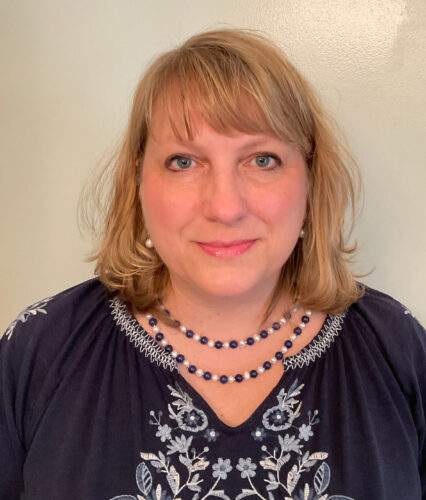
Jennifer Hanneken

Danielle Carr
Interested in learning about more problems of practice? Click here
A Conversation with Dr. Satabdi Basu
Comments Off on A Conversation with Dr. Satabdi BasuThis post features Dr. Satabdi Basu, a Senior Education Researcher at SRI International, an independent, nonprofit research institute.
Dr. Basu joined SRI International in 2016 after receiving her Ph.D. from Vanderbilt University in Computer Science (CS) with a specialization in AI for Education. At SRI, she leads projects in K-12 CS and AI education that give her the opportunity to work with school districts and focus on assessment and curriculum design and teacher professional development. She currently is working on several projects, including developing middle school CS teachers’ understanding of CS standards and formative assessment practices at Milwaukee Public Schools and bringing the SPICE (Science Projects Integrating Computing and Engineering) project to Metro Nashville Public Schools and Charlottesville City Public Schools. She is also working on an international project with school systems in Hong Kong that are focused on promoting computational thinking in primary grades.
Her research work also includes published articles summarized on our site:
- A Principled Approach to Designing a Computational Thinking Practices Assessment for Early Grades by Satabdi Basu, Daisy Rutstein, Yuning Xu, Linda Shear | ACM SIGCSE TS (2020)
- The Role of Evidence Centered Design and Participatory Design in a Playful Assessment for Computational Thinking About Data by Satabdi Basu, Betsy Disalvo, Daisy Rutstein, Yuning Xu, Jeremy Roschelle, Nathan Holbert | ACM SIGCSE TS (2020)
- What We Can Learn About Student Learning From Open-Ended Programming Projects in Middle School Computer Science by Shuchi Grover, Satabdi Basu, Patricia Schank | ACM SIGCSE TS (2018)
- Measuring Student Learning in Introductory Block-Based Programming: Examining Misconceptions of Loops, Variables, and Boolean Logic by Shuchi Grover, Satabdi Basu | ACM SIGCSE TS (2017)
- A Framework for Using Hypothesis-Driven Approaches to Support Data-Driven Learning Analytics in Measuring Computational Thinking in Block-Based Programming Environments by Shuchi Grover, Satabdi Basu, Marie Bienkowski, Michael Eagle, Nicholas Diana, John Stamper | ACM ToCE (2017)
Dr. Basu found the resources at CSEdResearch.org about 4 or 5 years ago when searching for survey instrumentation. She has used it ever since. She says, “I use the filters to find what I need, especially when writing literature reviews or designing instruments.” Internally at SRI, she endorses the resources on CSEdResearch.org and is always looking through the site to find new and updated information.
When asked why she uses CSEdResearch.org, she responded, “If it wasn’t there, I would be using Google Scholar to find papers, search for the instruments used, reach out to authors – that takes a lot of time. Using the site is easier and cuts down on the time of putting together instruments for projects or literature reviews for papers.”
In addition to the website, she also enjoys the tweets CSEdResearch.org provides that focus on brief informative guidance on instrument creation.
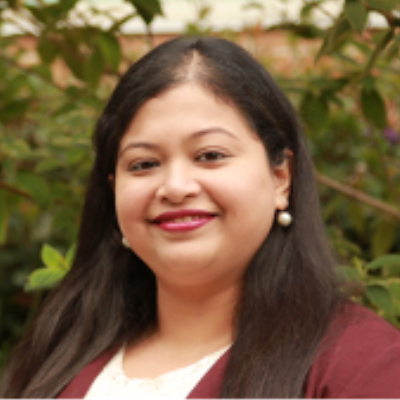 Dr. Satabdi Basu is a Senior CS Education Researcher at SRI International. She has published numerous articles on CS education research, particularly focused on computational thinking and K-12 students. She has presented at national and international conferences, and also been invited as a keynote speaker.
Dr. Satabdi Basu is a Senior CS Education Researcher at SRI International. She has published numerous articles on CS education research, particularly focused on computational thinking and K-12 students. She has presented at national and international conferences, and also been invited as a keynote speaker.
Meet Kristina Holsapple, an Undergraduate Computer Science Major
Comments Off on Meet Kristina Holsapple, an Undergraduate Computer Science MajorThis post features Kristina Holsapple. Kristina is third-year undergraduate student studying Computer Science at the University of Delaware.
Kristina Holsapple (she/they) is in their third year studying Computer Science at University of Delaware (UD) where they work with Dr. Cory Bart. They graduated from a high school where, unfortunately, there were no CS courses offered. Once they arrived at UD, they took a computing course with Dr. Bart and fell in love with the combination of human interaction and math.
As an underrepresented non-binary person in CS, Kristina said, “Sitting in the course I did not see anyone who looked like me so I knew I needed to stay and take up that space. There are very few non-binary people in my major at UD, someone has to be the first. As Dr. Bart says, ‘the best time to plant a tree was 50 years ago,’ so there is no better time than today to be that representation.” Kristina has also found a new home in the CS education research community. “The CS community is so welcoming,” she said. “I want to continue to empower others in the CS community, while also continuing rigorous technical research.”
Kristina first became aware of CSEdResearch.org and its resource center when Dr. Bart shared the Conducting Research page with her when she began to work with him. They used the site to dive deeper into the resources to guide writing of their literature reviews for research projects.
Kristina believes that the resource center “prompts rigorous quality of research and helps the overall CS community [conduct] research.” Kristina continues to share information she learned from CSEdResearch.org’s resources with fellow students. “I know that the information is high quality on your website because of the rigorous, high standards, which have also instilled those values into my own work as an undergraduate researcher,” she stated.
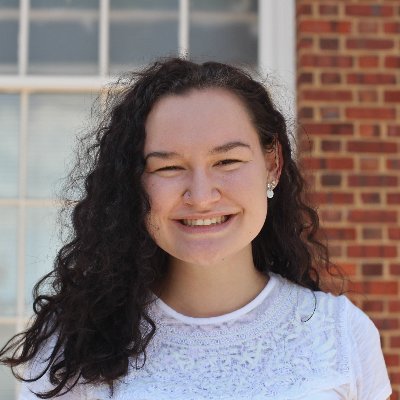 Kristina Holsapple is an undergraduate student studying computer science at the University of Delaware. She works with Dr. Cory Bart.
Kristina Holsapple is an undergraduate student studying computer science at the University of Delaware. She works with Dr. Cory Bart.
